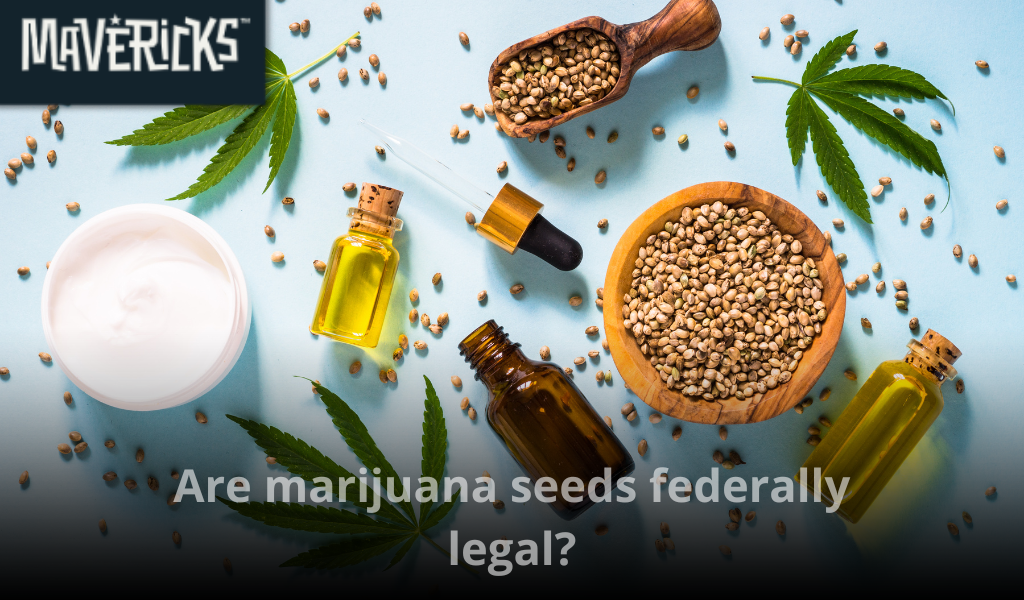Are marijuana seeds federally legal? Everything you need to know in 2025
As cannabis legalization continues to evolve across the United States, one question remains confusing for many home growers, collectors, and cannabis entrepreneurs:
Are marijuana seeds federally legal?
It might seem like a simple question, but the answer sits in a gray area shaped by federal drug laws, state-specific regulations, and recent DEA clarifications.
In this comprehensive guide, we’ll explain:
-
What the federal law says about cannabis seeds
-
How the 2018 Farm Bill changed the game
-
What the DEA has clarified in recent years
-
How to legally purchase, possess, and ship seeds
-
The risks and opportunities for growers in the U.S.
Cannabis Seeds vs. Cannabis Plants: What's the Legal Difference?
Let’s start with the basics.
Marijuana Seeds and the Controlled Substances Act
Under the Controlled Substances Act (CSA), cannabis is classified as a Schedule I drug—alongside heroin and LSD—meaning it's considered to have a high potential for abuse and no accepted medical use (despite what 38+ states currently legislate).
This classification technically applies to:
-
Cannabis flowers
-
Extracts (THC, concentrates, resins)
-
All derivatives and isomers
-
And yes, seeds
But here’s the twist: the law is concerned with delta-9 THC, the primary psychoactive compound in cannabis. So what happens if the seed contains less than 0.3% THC?
The 2018 Farm Bill: Where It All Changed
The Agricultural Improvement Act of 2018—aka the 2018 Farm Bill—made a clear distinction between marijuana and hemp:
Hemp = Cannabis sativa with ≤ 0.3% delta-9 THC by dry weight
Marijuana = Cannabis sativa with > 0.3% delta-9 THC by dry weight
Under this definition, hemp and its derivatives—including seeds—are federally legal.
This opened the door for CBD products, industrial hemp farming, and—unexpectedly—for the legality of cannabis seeds under certain conditions.
DEA Clarification: Seeds Are Legal (Sort Of)
In a groundbreaking letter issued in 2022, the Drug Enforcement Administration (DEA) clarified that:
"Cannabis seeds containing no more than 0.3% delta-9 THC on a dry weight basis meet the definition of 'hemp' and are not controlled under the CSA."
(Source: Marijuana Moment – DEA letter)
What does this mean?
-
Cannabis seeds are federally legal, even if they’re genetically programmed to grow THC-rich marijuana plants.
-
This applies to regular, feminized, and even autoflowering marijuana seeds, as long as the seed itself contains less than 0.3% delta-9 THC.
In other words, the chemical composition of the seed matters more than its genetic potential.
Can You Legally Buy or Sell Marijuana Seeds in the U.S.?
Yes, as of today, it is federally legal to buy, sell, and possess cannabis seeds that meet the “hemp” threshold defined by the 2018 Farm Bill.
This includes:
-
Collectors
-
Breeders
-
Distributors
-
Online seed banks (like Mavericks Genetics)
-
Medical and recreational growers in legal states
You can also legally ship seeds across state lines, but here’s where things get tricky...
The Catch: Cultivation Is Still Federally Illegal
While seeds may be legal, growing them into marijuana plants is not federally permitted unless:
-
You are operating under a licensed state program
-
You’re growing hemp (and staying under the 0.3% THC threshold)
-
Or you’re in a state where recreational or medical marijuana is legal
So yes, you can own seeds, but germinating them can be illegal, depending on where you live.
State Laws Vary (A Lot)
Every U.S. state has its own cannabis laws, ranging from full legalization to total prohibition.
| State Type | Cannabis Seeds Legal? | Germination Legal? |
|---|---|---|
| Legal (rec + medical) | Yes | Yes (within limits) |
| Medical only | Yes | Yes (for patients) |
| Decriminalized | Yes | Legally gray |
| Prohibited | Yes (under DEA rule) | No |
Always check your state laws before planting any cannabis seed, even if purchased legally.
Are All Marijuana Seeds Under 0.3% THC?
Yes. Cannabis seeds themselves do not contain cannabinoids in measurable quantities. THC and CBD are produced after germination, as the plant matures and begins flowering.
That’s why even seeds of powerful strains like:
-
Wedding Cake
-
OG Kush
-
Gorilla Glue
-
Zkittlez
...are legal at the federal level, because they don’t contain THC until they grow.
Can You Import or Export Marijuana Seeds?
International shipping of cannabis seeds remains legally complex. Even if they are considered hemp under U.S. law, other countries may have:
-
Strict drug import laws
-
Bans on cannabis genetics
-
Different thresholds for THC content
In most cases, it is legal to import seeds into the U.S. as long as they comply with the Farm Bill—but you should consult a legal advisor or customs policy if unsure.
How This Impacts You as a Grower or Collector
If you’re a grower:
-
You can legally buy and possess marijuana seeds in the U.S.
-
You can plant them only in states where cultivation is allowed.
-
Always germinate seeds in compliance with state-level regulations.
If you’re a collector:
-
You can legally collect, store, and trade cannabis seeds.
-
Many collectors treat seeds like genetics or heirlooms, not for growing.
-
Label and store your seeds properly, especially if shipping them.
Conclusion: Seeds Are Legal, Plants Are a Different Story
Thanks to the 2018 Farm Bill and DEA clarification, marijuana seeds are federally legal in the United States, as long as they contain less than 0.3% delta-9 THC.
This means:
-
You can buy, sell, collect, and ship cannabis seeds without violating federal law.
-
But growing marijuana from those seeds remains federally illegal, unless allowed by state law.
At Mavericks Genetics, we stay up to date with legal changes to provide compliant, high-quality cannabis seeds for collectors, growers, and breeders. Whether you’re building a genetic library or starting your next legal grow, we’ve got you covered.

Share:
Can I order marijuana seeds online?
How to germinate marijuana seeds in soil: The complete grower’s guide